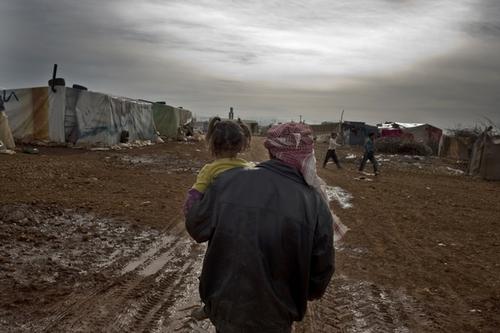Lebanon is home to the majority of Syrian refugees and the MSF report, “Misery Beyond the War Zone”, shows that of the 220,000 Syrians who have sought refuge so far in the country, many cannot obtain necessary healthcare, among other worrying findings.Geneva/Beirut, 7 February 2013 – Syrians who have fled violent conflict at home in search of safety in Lebanon do not receive anywhere near adequate levels of humanitarian assistance and are living in extremely precarious conditions, a detailed survey released today by MSF reveals.
The survey reveals a marked deterioration in the humanitarian situation in Lebanon. This is in large part due to extremely lengthy delays in registration, as refugees in Lebanon are not entitled to formal assistance if they are not registered.
“Registration should not be a condition for receiving assistance in any emergency crisis,” said MSF General Director Bruno Jochum. “Yet access to humanitarian aid is seriously hampered by the difficulties many refugees encounter in registering on arrival in Lebanon. The roll-out of aid must be accelerated and expanded.”
Syrian refugees and other displaced people in Lebanon do not have access to free healthcare and adequate shelter. Living conditions for the majority of refugees and Lebanese returnees remain extremely precarious. More than 50 per cent of people surveyed by MSF, whether officially registered or not, are housed in substandard structures: in inadequate collective shelters, farms, garages, unfinished buildings or old schools. Most provide paltry protection against the elements, if any. The dire living conditions are contributing to deteriorating health.
The survey was completed in late December 2012, and involved 2,100 Syrian refugee families. Seventy-five per cent of respondents are living in conditions utterly unsuitable for the hardships of winter. People registered with the UN refugee agency, UNHCR, are entitled to food and fuel vouchers and healthcare cost coverage but more than 40 per cent of those surveyed were not officially registered.
“We are in an extreme situation, we don’t have enough food and we don’t know who to go to for help. The only food we receive is purely out of the solidarity of our Lebanese neighbours. As adults we can eat once a day, but we cannot tell our children to do the same,” says a refugee father. “If we didn’t fear the bombing in Homs we would go back immediately.”
Roughly one in four of the interviewees said they had not received any assistance, while 65 per cent said they had received only partial assistance that did not cover their family’s needs. In most parts of Lebanon, the capacity of host communities to absorb refugees has reached its limit. Families that arrived earlier are fast running out of money to pay for food and shelter and have no access to basic medical care.
The medical situation has clearly deteriorated over the past six months. More than half of all interviewees (52 per cent) cannot afford treatment for chronic diseases and nearly one-third have been forced to suspend treatment because it was too expensive to continue. Child vaccinations, prescription drugs, antenatal and obstetric care and basic health maintenance are often out of reach.
Access to medical services for the most vulnerable – whether they are registered or non-registered, Palestinians, refugees from Syria or Lebanese returnees – must be made an immediate priority and acted upon. All refugees must be provided with assistance immediately upon their arrival in Lebanon and guaranteed access to healthcare.
“It is time for donors to truly commit themselves to doing what is needed to address the growing needs of the refugee population in Lebanon, and for national and international aid actors to evaluate the methods and the amount of the aid they are providing,” said Jochum. “MSF is calling on the authorities and agencies to accelerate the establishment of reception centres for newcomers and to make collective shelters adapted to winter conditions available immediately, in order to cope with the increasing influx of refugees.”
MSF has been providing humanitarian assistance to Syrian refugees in Lebanon since November 2011. In 2012, MSF carried out more than 23,000 consultations in the Bekaa Valley and in Tripoli. Since November 2012, MSF has distributed 25,580 basic relief items to Syrian refugees scattered throughout the Bekaa Valley. In mid-January 2013, MSF began distributing fuel vouchers to refugees, with 300 families now able to have heat for two months. As of today, MSF has doubled its staff from 50 to 112 and is scaling up its operational response.
In Syria, MSF is working in three hospitals in the north of the country, in areas controlled by armed opposition groups. Medical teams provide emergency care, surgery and maternal healthcare. Between June 2012 and early January 2013, MSF teams conducted more than 11,000 consultations and performed more than 1,200 surgical procedures. MSF is also providing medical and surgical services to Syrian, Palestinian and Iraqi refugees in Jordan, Lebanon and Iraq.



